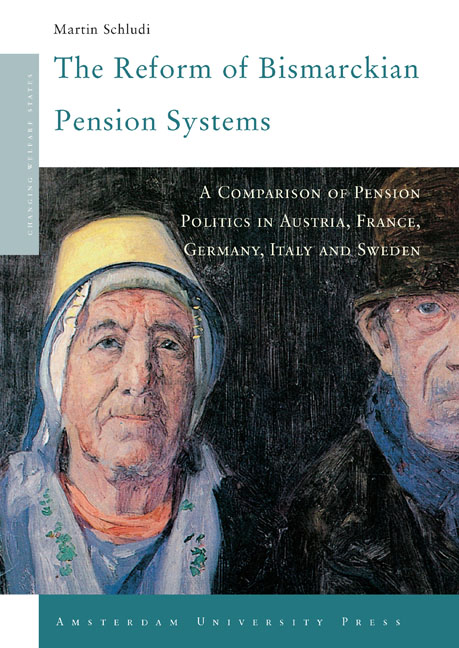 The Reform of Bismarckian Pension Systems
The Reform of Bismarckian Pension Systems Published online by Cambridge University Press: 24 January 2021
In the previous sections I have shown that the interplay between economic, demographic, and political pressures on Bismarckian pension schemes has triggered a multitude of reform measures throughout the 1990s, which were primarily but not exclusively aimed at curbing the growth of pension spending. This development has also left its mark on the scholarly debate about the welfare state. In recent years, welfare state research has gradually shifted from studying welfare state expansion to studying the retrenchment of welfare state arrangements (Green-Pedersen and Haverland 2002). In this chapter, I will first provide a brief survey of the most important theoretical approaches to welfare state retrenchment and discuss their usefulness for the explanation of pension policy outcomes. I will then develop a distinct theoretical framework based on the concept of actor-centred institutionalism. This framework establishes a number of heuristic hypotheses that allow us to identify the political and institutional conditions facilitating or impeding the problem solving capacity of national pension policymakers.
Social policymaking in an era of retrenchment:A review of theoretical approaches
The new politics of the welfare state
In his seminal 1994 work, the Politics of Retrenchment, Paul Pierson has pointed to the remarkable resilience of welfare state arrangements in spite of an increasingly fierce climate of fiscal austerity. Following Pierson, the politics of retrenchment is qualitatively different from the politics of expansion. While the “old politics” of welfare expansion is seen as a strategy of “credit claiming” for highly popular initiatives, the “new politics of the welfare state” is regarded as an attempt to avoid blame for unpopular policies. Once social policies have become established in a society, a powerful network of interests is likely to evolve around these arrangements, which will try to avert any efforts aimed at rolling back the welfare state. As Pierson has argued in his earlier work (1994; 1996), these client-based policy interest groups have to a large extent replaced leftist parties and trade unions as upholders of welfare objectives. Their impact on the success of governmental retrenchment efforts will primarily depend on the specific structure of welfare programmes. According to Pierson, the inherited profile of social policy programmes is the most important predictor for the relative resilience of welfare arrangements.
To save this book to your Kindle, first ensure [email protected] is added to your Approved Personal Document E-mail List under your Personal Document Settings on the Manage Your Content and Devices page of your Amazon account. Then enter the ‘name’ part of your Kindle email address below. Find out more about saving to your Kindle.
Note you can select to save to either the @free.kindle.com or @kindle.com variations. ‘@free.kindle.com’ emails are free but can only be saved to your device when it is connected to wi-fi. ‘@kindle.com’ emails can be delivered even when you are not connected to wi-fi, but note that service fees apply.
Find out more about the Kindle Personal Document Service.
To save content items to your account, please confirm that you agree to abide by our usage policies. If this is the first time you use this feature, you will be asked to authorise Cambridge Core to connect with your account. Find out more about saving content to Dropbox.
To save content items to your account, please confirm that you agree to abide by our usage policies. If this is the first time you use this feature, you will be asked to authorise Cambridge Core to connect with your account. Find out more about saving content to Google Drive.